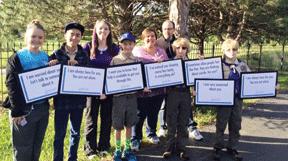
Having a child precede you in death is unimaginable, unthinkable, unspeakable.
Having a child take their own life can seem insurmountable, even after years have passed. It cuts you to your very core.
Jason was our precious son. My husband, daughter and I adored him and only wanted him to be happy and content in life, despite its inevitably bumpy course. Jason never felt that he was “good enough,” which for him, in his own mind, meant being perfect. Having had similar struggles myself when young, I considered him a soulmate, a weary traveler down a seemingly interminable road.
I was so proud of his many accomplishments, even prouder because he did so well despite having a punishing adversary in his way from a young age. Many people have this villain fighting them every day. It is the disease of depression, carrying with it suicidal ideation, and constant feelings of inadequacy and loneliness.
Sadly, I find that even some of my closest friends, who knew Jason, are silent when I mention his name. Perhaps they wish that I would pretend that he didn’t exist, and that suicide doesn’t exist. That it isn’t a crisis. That the incidence isn’t the highest it has been in the past 30 years. And that it isn’t the second most common cause of death for ages 15-24.
I get it. It’s certainly easier for me to keep busy at work, get home late, do the necessary chores and escape in sleep. I can’t stand to be alone with my thoughts.
Sometimes, as a neurologist, I delude myself and wish that I had a memory disorder, like my mother and so many of my patients, that would permit me to only remember Jason as a youngster with big brown eyes, a precious smile, sweet voice and treasured laugh.
I have practiced for 23 years now. It wasn’t that long ago that people were ashamed to discuss cancer and Alzheimer disease because of the stigma attached to them. It was discussed in hushed tones. I want the same stigma to disappear for all brain disorders like depression, bipolar disease and schizophrenia. They are indeed brain disorders just like Parkinson disease and multiple sclerosis.
We need to change our mindset. That is why we started the SPEAK UP effort with our dear friend Allie Doss, who also lost a child, Sara Prideaux, to suicide in 2015. Working with the Greater Kansas City Mental Health Coalition and Jewish Family Services, we have united to break the silence of mental illness and to reduce its stigma.
By attending our upcoming SPEAK UP Walk on Sunday, Oct. 9, at Ironwoods Park in Leawood, you will learn how to start a conversation with a friend or family member about mental illness. You will also be able to learn about resources that are available in our community. Even if you can’t attend, you can learn more about mental illness at speakup.us and www.itsok.us. We also accept donations to help us bring mental health resources to local high schools.
Please stand up and speak up, and together, we can make a difference.
Karen Arkin is a physician who lost her son Jason when he completed suicide. Karen and her husband Dr. Steve Arkin are working closely with the Greater Kansas City Mental Health Coalition and Jewish Family Services on a teen mental health campaign.